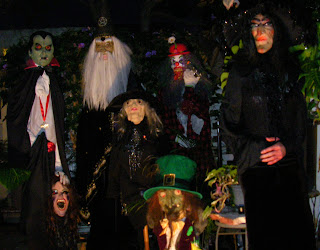"This tradition of remembering the dead is already ingrained in our culture which is uniquely Filipino and that makes it a part of our identity."
As a kid, I did not know exactly what my mother was up to. At exactly six at dusk, she would light each of the twenty four candles on two opposite rows at twelve each. A pair of neatly cut fresh banana bark served as holders for the candles. In between the rows were different kinds of speciality dishes offered to the souls. (And there is tuba too, a fermented sap collected from a lopped-off tip of coconut trees which is mildly alcoholic.) Everytime she lights each candle, she would utter a name as though she is summoning a spirit. Each candle is assigned to a dead family member from both my maternal and paternal side. (Till now, I'm still puzzled at the figure, what if there is more than twelve dead relatives from both sides, certainly jealousy and envy exist among the dead for the favoritism, hmmn...) And whenever a moth gets to land on the offerings, my mother would tell us, "that's probably one of my dead sisters or one of my relatives!". Yuck!
My mother of course is not a witch or a sorceress (before you let fly of your creepy imagination), she just follows tradition inherited from her ancestors. Every eve of first November, the rituals are ever present and really exciting. I remember rescuing one of her 'relatives' helplessly bulldozing its way out of the sticky suman that I accidentally de-winged it. I screamed rushing to the kitchen and told my mom of my supposed botched rescue effort. "Your relative must be dead again!" I was only five or six that time and a very scheming mind. Of course we would see our supposed moth-relatives coming in a whisper and seem to be enjoying every bit of the feast but not the foods per se but the bright lights that torched most of them. (Stupid kins!)
Early morning of first November, every home in our place is abuzz with their own preparation for "Fiesta Minatay" or Feast of the Dead. Local folks do not bother as much whether it is the All Saints Day or All Souls Day. As long as it is first of November, it is a feast in every sense of the word. This day has been a great tradition that everyone believes it is an obligation to offer foods to the dead so that the living gains approval from them and receive more blessings the entire year. This same day is rather sobering if you think pig is cute. The sounds of them wailing in unison in every neighborhood punctuate the atrocious porky appetite of these 'dead souls' who supposedly demand swimming in oily humba or valenciana come visiting time. Even as a kid, I never liked watching these poor pigs being butchered. "Why can't the souls eat just suman and drink tuba?"
If you think everyone dresses up for the occasion, no we do not. There is no Halloween costume parade just like in the US or any parts of the West. First off, our place is one of the unfortunate spots on earth where electricity fears to tread, (there were attempts before but blame it on thieves and the NPAs that those with good intentions just spontaneously shy away from thinking over), so nobody ventures outside deeper into the night. If in the US they have the ubiquitous 'trick or treat' at night (albeit an eve earlier), unconsciously we too have our own version. We would make improvised torch using kerosene to go house to house and ask for ibos, (a sticky rice cake cooked in coco milk and wrapped in coconut leaves), for which the hosts willingly oblige, and cluster them around our waist so that when we get home we have a bunch of them. Sometimes we would hear scary sounds from the rows of sugarcane fields and run as fast as we could. Bigger kids would make fun of the 'pale-balled' little ones howling in fear. Others could get stuck in dirt mud while trying helplessly to salvage a doomed pair of slippers.
Time has changed since but tradition remains. Over the years, man's perception of life could also change. As for our family, we still celebrate the occasion but no more offerings for the dead. The dead do not come back in the form of a moth or any other insect just like my mother told me. (My mom has already repudiated her old-aged belief of the dead coming back on the eve of Halloween.) This tradition of remembering the dead is already ingrained in our culture which is uniquely Filipino and that makes it a part of our identity. Whether it is appropriate for Christians to celebrate Halloween is a matter of one's own conviction. As I said it is a tradition identifiable to certain cultures that gives honor and in remembrance of dead loved ones. There is no right or wrong answer why Halloween is celebrated by those who have found the truth. At the end of the day, one's own conviction must be individually sought, independently found and personally followed. HAPPY HALLOWEEN!!!































